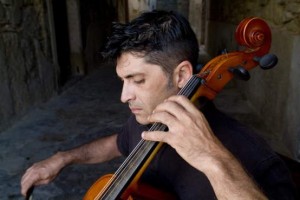
During the now-legendary beginnings of Madredeus in the late eighties, the group rehearsed in the wing of an old Lisbon convent. For anyone who has heard them, this was a perfect venue for their fado-influenced folk music. After those modest beginnings, Madredeus would go on to sell millions of records and become a success not just in their native Portugal, but worldwide. Yet founding member Francisco Ribeiro, who died on September 14 at the age of 45 from liver cancer, gave the impression that he would rather play his cello back in that old convent by the River Tagus, than tour the world as part of such a wildly successful group.
“(Ribeiro was a) fragile person, in the most hardworking and determined group that I ever came across,” said David Ferreira, formerly of Madredeus’ record company, EMI.
The description of the group in such terms might surprise those who know their music and its ethereal melancholy, fronted by the supernatural voice of Teresa Salgueiro. And yet, not long after their beginnings in that convent, Madredeus mined, with incredible success, a demand by their compatriots for a fresh approach to the country’s traditional music and fado. The group were young and driven, but they were not seeking to upset the purists – their words were unabashedly lyrical, their record sleeves as intriguingly atmospheric as their music and the members wore matching suits for performances.
Guitarist and main songwriter Pedro Ayres Magalhães, who described their sound as “artesanal”, led the ensemble, but Ribeiro’s cello was the anchor around which the music was built, with an accordion and keyboard filling out the backing to Salgueiro’s vocals.
Ribeiro’s playing can be heard at its brilliant best on O espírito da paz (1994), possibly Madredeus’ greatest achievement and the album that preceded the worldwide recognition that Ainda, the soundtrack to Wim Wenders’ film Lisbon Story, would bring. It is perhaps no coincidence that after Ribeiro’s departure from the group in 1997, their albums became less and less rewarding and the nostalgia-tinged sound increasingly manicured.
“Madredeus were a journey that formed me in many ways, but at that point I had to stop,” Ribeiro told Ípsilon magazine last year. “There was anger. Egos, money, different musical paths. It was like The Beatles. I loved it, but it finished. I could now follow my path.”
That path would take Ribeiro to the Roman town of Bath, in southwest England, where he continued the academic musical studies he had embarked on years earlier, before fame beckoned. He described his stay in Bath as a “spiritual retreat” and he played with both the Stroud and Gloucester Symphony Orchestras, before returning to Portugal and recording a solo album with Porto’s national orchestra.
While other members also left the band (including Salgueiro, in 2007), Madredeus still continues, albeit in an almost unrecognisable incarnation, as Madredeus & A Banda Cósmica. Ribeiro, meanwhile, is gone, but his music lives on.
Leave a Reply
You must be logged in to post a comment.